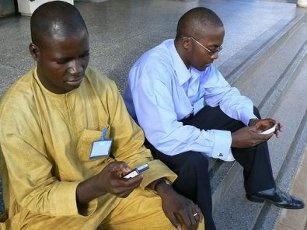How technology is helping African citizens to hold their governments accountable for real economic and social progress
Shimmering new call centres, the rapid explosion of mobile phones and Internet connections today mark the landscape of many African cities - where improved Information and Communication Technology (or ICT) infrastructure is helping connect urban dwellers to global networks.
Though the continent is rapidly urbanising - 3.5 per cent of Sub Saharan Africa’s one billion people move into cities each year - and local governments have trouble providing essential public services to the growing numbers of people, many municipalities are taking advantage of the rise of ICT to improve the lives of their residents.
“By linking citizens and municipalities, ICT can serve as an effective tool for strengthening urban governance, which is the key to addressing the challenge of urban development,” said Junaid Ahmad, the World Bank’s Sector Manager for Africa Urban and Water.
Helping cities respond more quickly and efficiently
In Addis Ababa, Ethiopia’s capital, one municipality is using Geographic Information System (GIS) technology to create urban planning proposals, arrange public services, and devise 'targeted' revenue models. City officials apply this GIS to scientifically assess property transaction information as well as accurately evaluate all taxes related to land. As a result, in just the first year of implementation, the municipality increased its revenue from Ethiopian birr 5 million to 36 million - significantly adding to the return on investment for GIS.
“GIS can help cities gather information in real-time on infrastructure and water issues to pin-point which areas need attention,” said Gaurav Relhan, an ICT specialist at the World Bank. “Geo-referenced data can generate maps that reveal spatial relationships, patterns and trends that governments can use to manage and plan urban infrastructure by using the participation of their citizens.”
Citizen-focused environment
E-Government solutions like the ‘Smart City’ initiative in Cape Town, South Africa, and the Contribution Network Project (CNP) in Mauritius, have allowed municipalities to efficiently manage resources, streamline tax collection, and help create a citizen-focused environment.
“Smart City uses a dual approach - an ‘external’ dimension vastly enhances the ability of citizens to access and harness ICT for self-development, while ’internal’ initiatives involve standardisation of IT services and related ICT capacity building within the city administration,” Relhan said.
Relhan and his colleagues recently completed a guidebook aimed at assisting local governments and municipalities in Africa adopt ICTs in different areas of governance, ranging from collecting bills to geo-mapping during emergency situations.
“We wanted to show governments how the rapid expansion of mobile communications and Internet usage in Africa can be harnessed for urban governance and development,” Relhan said.
Using ICTs for social accountability and governance
The guidebook, Good Urban Governance through ICT: Issues, Analysis, and Strategies, focuses on areas like social accountability and how technology can encourage citizen-centreed governance.
Technology helps well-informed citizens collaborate, exchange ideas and participate in real-time with their elected officials, according to Relhan. Voters can have their voices heard and officials can incorporate this feedback in their decisions.
For instance, through mobile phones and the Internet, a Facebook page or post, a Tweet or a YouTube video, a citizen now has the power to participate at his fingertips to improve outcomes and trap corruption. Examples include tracing expenditures to see if there is sufficient spending by region or sector; tracking procurement results to see if vendors seem to be getting too much business or charging too much; and on-the-ground pictures to show whether projects were actually completed.
In Kenya, an e-Government service in six towns includes an Internet-based tool that allows citizens to anonymously report instances of corruption. The service is part of the country’s Electronic Graft Management (EGM) project. A survey conducted in two municipalities as part of the project showed that:
80 per cent of respondents felt that computerisation had improved financial transparency
82 per cent of respondents felt municipal financial management had become more effective
80 per cent of respondents felt e-Government services improved accountability, as they could now track business permit licenses and monitor all payments handled by city councilors.
And following the introduction of the e-Government services project, public participation in administration in the two municipalities rose from 3.2 per cent to 43 per cent within 18 months of launch.
“This is taking place at the most opportune time in Africa,” said Veronica Ugwu, a resident of Nairobi’s Kilimani area, who queued up one afternoon to sign up for the e-Government service. “Hopefully now more public will come forward to lodge complaints and give feedback voluntarily.”





















